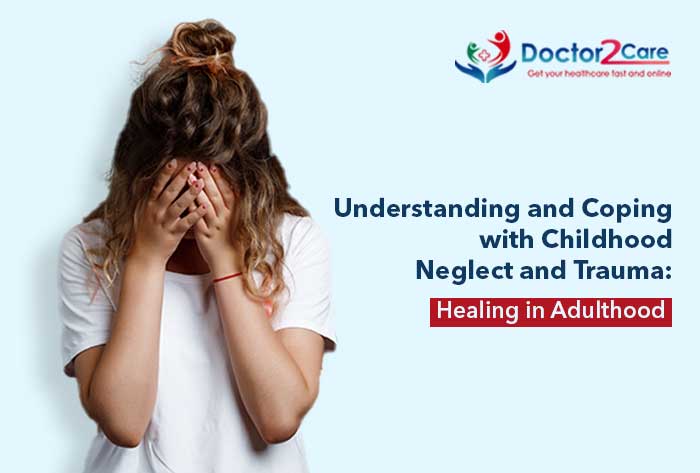Understanding and Coping with Childhood Neglect and Trauma: Healing in Adulthood

Childhood is a crucial time for development and growth, both physically and mentally. It is a time when children learn about the world around them, develop social skills, and form attachments to the important people in their lives. It is also the time when they need love and support because they are new to many things that they see for the first time.
However, for some children, childhood can be marked by neglect and trauma, which can have a lasting impact on their mental health and well-being. Their trauma can come from some accident they have faced, or been bullied or had a disturbed home environment.
Adults who had a neglectful and traumatising childhood may be at increased risk for a range of mental health issues. This blog has some of the most common mental health issues that may arise as a result of such experiences. If you are having any such mental health disorder of difficulty, immediate check up is a must with online doctor consultation India .
Post-traumatic stress disorder (PTSD)
PTSD is a mental health condition that can develop after a person experiences or witnesses a traumatic event. Childhood neglect and trauma can lead to the development of PTSD in adulthood. Symptoms may include flashbacks, nightmares, avoidance behaviour, and hyperarousal.
Adults who experienced childhood neglect and trauma may have a heightened sensitivity to threat and danger, which can make them more prone to developing PTSD. This sensitivity may also make it more difficult for them to feel safe and secure in their adult relationships and surroundings.
Treatment for PTSD
Treatment for PTSD may involve therapy and medication. Cognitive-behavioural therapy (CBT) is a type of therapy that can be effective in treating PTSD. It involves helping people to identify and change negative thought patterns that contribute to their symptoms.
Depression

Chronic feelings of sadness, hopelessness, and worthlessness can be common in adults who experienced neglect and trauma during childhood. Childhood neglect and trauma can cause a range of negative emotions and feelings, including grief, anger, guilt, and shame. These emotions can linger into adulthood and contribute to the development of depression.
Treatment for Depression
Depression can be treated with therapy, medication, or a combination of both. Psychotherapy, also known as talk therapy, can be effective in treating depression. Cognitive-behavioural therapy (CBT) and interpersonal therapy are two types of therapy that can help people to address the negative thoughts and emotions that contribute to their depression.
Anxiety Disorders

People who experienced childhood neglect and trauma may have an increased risk of developing anxiety disorders such as generalized anxiety disorder, panic disorder, or social anxiety disorder. Childhood neglect and trauma can lead to a sense of insecurity and unpredictability, which can contribute to the development of anxiety disorders.
Treatment for Anxiety Disorder
Anxiety disorders can be treated with therapy, medication, or a combination of both. Cognitive-behavioural therapy (CBT) is a type of therapy that can be effective in treating anxiety disorders. It involves helping people to identify and change negative thought patterns and behaviours that contribute to their anxiety.
Substance Use Disorders
People who experienced childhood neglect and trauma may be more likely to use drugs or alcohol as a way of coping with their feelings. Substance use can provide temporary relief from negative emotions and memories, but it can also lead to addiction and other negative consequences.
Treatment for Substance Use Disorder
Treatment for substance use disorders may involve therapy, medication, or a combination of both. Behavioural therapies, such as cognitive-behavioural therapy (CBT) and contingency management, can be effective in treating substance use disorders. Medications, such as naltrexone and buprenorphine, can also be used to help people manage their cravings and withdrawal symptoms.
Borderline Personality Disorder
Borderline Personality Disorder is a mental health disorder characterised by a pattern of unstable relationships, emotional dysregulation, impulsivity, and distorted self-image. Childhood trauma and neglect are common risk factors for the development of Borderline Personality Disorder.
Treatment for Personality Disorder
Treatment for Borderline Personality Disorder may involve therapy, medication, or a combination of both. Dialectical Behavioral Therapy (DBT) is a type of therapy that can be effective in treating Borderline Personality Disorder. It involves helping people to develop skills for.
Wrapping Up
Adults who experienced neglectful childhood and pre teens trauma may be at increased risk for a range of not only the mental health issues but physical health too.
These mental health issues may include post-traumatic stress disorder (PTSD), depression, anxiety disorders, substance use disorders, and borderline personality disorder. It is important for individuals who have experienced childhood neglect and trauma to seek professional help in order to address and manage these mental health issues.
If you think you are potentially suffering from these, you need to check with a therapist. You can for online doctor consultation India through applications like Doctor2Care. The treatment may involve therapy, medication, or a combination of both.